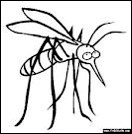It's like a sequel to a bad movie.
Flood mosquitoes inundated the Battlefords due to rising waters in 2011, and now they're back for another human snack. Again.
While one is tempted to call this sequel "Revenge of the Killer Mosquitoes 2," the reality is these Aedes Vexan flood mosquitoes aren't "killers" at all as far as spreading disease is concerned.
They're just pests, and local residents are fed up.
The mosquitoes have successfully ruined baseball and softball games for spectators, as well as countless outdoor events during the evenings when they are most prevalent. Worse yet, they are finding their way into office buildings and many houses right across the Battlefords.
"I battle them at home," admits a frustrated city communications and marketing co-ordinator Mike Halstead.
Officials at North Battleford City Hall are aware of the prevalence of the Aedes Vexan mosquito - a breed that is a particular nuisance compared to the usual mosquitoes that show up in an ordinary year.
"They're more aggressive, they're more sticky, you swat at them but they keep coming back," said Halstead. "A lot of mosquitoes just take off, but it's just an aggressive breed that we see when there's more water laying around."
It was a similar situation in 2011 when there was flooding around the North Saskatchewan River due to the spring runoff. The problem in 2013 is that there was even more flooding this time.
There is more standing water in the area due to the recent flooding on the North Saskatchewan River, a flood that proved so bad that it required barriers to be put up at Water Treatment Plant No. 1 to keep the water out.
While the water eventually receded, it left water in nearby fields and banks - exactly the type of water that breeds the flood mosquitoes.
The City had been out weekly since May with a larvicide program, using a granular substance called VectoBac that is applied to standing water, where mosquito eggs are laid.
The mosquitoes are killed at the larvae stage before they hatch into flying adults. "They find it's the most safe, efficient, ecological way to control the mosquitoes in a normal year," said Halstead.
Unfortunately, VectoBac is applied just in the city limits, said Halstead, which makes it very hard to keep up with the mosquitoes that do get hatched.
"This year is exceptional because we do have a lot of standing water laying around and they do breed very rapidly," said Halstead. "They also blow in from outside the city limits, so they are just hard to control at times of year when we do have a lot of water still laying around."
As for spraying, that has not been done for a number of years due to environmental concerns. Halstead points out most other communities in the province have dropped spraying for the same reason.
The mosquitoes are more a pest than a health concern. There has been heightened concern and warnings issued about West Nile Virus in the past several days from Prairie North Health Region and WPD Ambulance, but that is spread by the larger Culex Tarsalis mosquito and not the Aedes Vexan variety.
However, their suggestions for battling the Culex Tarsalis mosquito - to limit outdoor activities at night and eliminate standing water in yards, among others - are relevant in battling flood mosquitoes as well.
Halstead is urging local residents to remove any standing water from their yards and birdbaths and to keep grass cut to reduce sites for mosquito breeding. "It does cut down on the number of mosquitoes flying around," Halstead said.
Residents are also being urged to wear light coloured long-sleeved shirts and pants when outside, to use mosquito nets over infant playpens and strollers, and apply insect repellent with DEET, though DEET should not be used on children under six months old. Residents are also urged to reduce outdoor time between dusk and dawn to keep from being bitten, and to make sure windows and doors are tight fitting and have proper screens.
That will help residents deal with the flood mosquito situation, which Halstead expects will ease in a couple of weeks when they should start to die off and diminish in number.
In the meantime, the City plans to keep up their efforts to control the mosquitoes.
"We're doing what we can," Halstead said.

.png;w=120;h=80;mode=crop)

.png;w=120;h=80;mode=crop)
